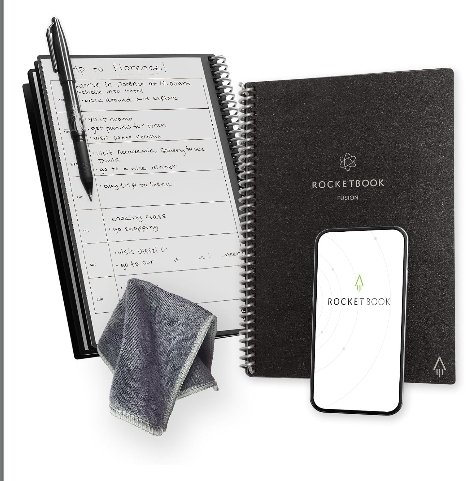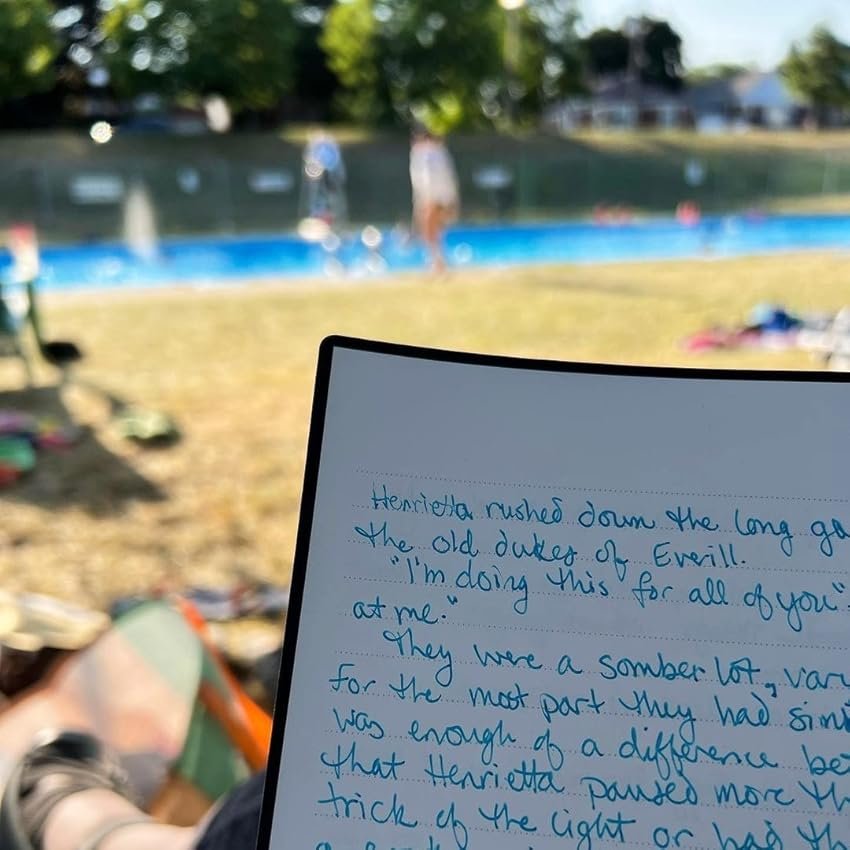In an era dominated by digital tools, the Rocketbook Fusion offers a unique hybrid solution for those who cherish the tactile experience of pen and paper but crave the convenience of digital organization.
This reusable smart notebook combines traditional writing with modern cloud integration, appealing to students, professionals, and eco-conscious users.
By blending templates for planning, note-taking, and creativity with seamless app connectivity, the Rocketbook Fusion aims to reduce paper waste while enhancing productivity.
Overview of Rocketbook Fusion

The Rocketbook Fusion is a reusable notebook with 42 synthetic, waterproof pages designed for infinite reuse. It works exclusively with Pilot FriXion pens, whose thermochromic ink bonds to the pages until erased with water and a microfiber cloth. The notebook comes in two sizes: Letter (8.5 x 11 inches) and Executive (6 x 8.8 inches), both featuring a spiral binding for durability.
Key Features
- Templates for Every Task:
The Fusion includes seven pre-designed templates:
- Task lists
- Weekly and monthly planners
- OKR (Objectives and Key Results) goal sheets
- Dot-grid and lined pages for notes and sketches.
These templates cater to productivity systems like bullet journaling or project management, eliminating the need to manually draw layouts.
- Cloud Integration via the Rocketbook App:
Users scan pages using the free app, which enhances image quality and sends scans to cloud services like Google Drive, OneNote, or email. The app supports Smart Titles (auto-naming files with hashtags) and Smart Search, which locates handwritten text using OCR (Optical Character Recognition). - Eco-Friendly Design:
The Fusion’s reusable pages reduce paper waste, aligning with sustainability goals. One user noted replacing “stacks of paper notebooks” and decreasing reliance on disposable post-its. - Collaboration and Sharing:
Scans can be sent to multiple recipients or platforms simultaneously. For example, a monthly calendar can be shared with a team via Slack or a family via email.
Pros and Cons of Rocketbook Fusion

Pros
- Sustainability:
Reusable pages significantly cut paper consumption, appealing to eco-conscious users. Testimonials highlight reduced clutter and environmental impact. - Versatile Templates:
Pre-designed layouts streamline planning and note-taking, saving time for busy professionals and students. - Powerful App Features:
The app’s OCR and Smart Search simplify organizing handwritten notes, while cloud integration ensures accessibility across devices. - Cost-Effective Long-Term:
Despite a higher upfront cost (~$35–$48), the Fusion eliminates the need for multiple notebooks, saving money over time.
Cons
- Pen Limitations:
The included Pilot FriXion pen may smudge if not allowed to dry, and some users report inconsistent ink flow. Upgrading to higher-quality FriXion pens is recommended. - Scanning Dependency:
Digitizing notes requires manual scanning, which can be tedious compared to real-time syncing with digital tablets. - Learning Curve:
New users must familiarize themselves with symbol-based cloud shortcuts and app settings, which may overwhelm technophobes. - Durability Concerns:
The plastic cover scratches easily, and excessive pressure while writing can indent pages, reducing longevity.
FAQs
What is the disadvantage of Rocketbook?
Rocketbook, while innovative, has a few limitations. The most significant is its reliance on Pilot FriXion pens, which restricts user flexibility. Ink from other pens won’t erase and can permanently damage the pages. Additionally, Rocketbook pages are sensitive to heat—exposure to high temperatures may cause notes to disappear. Although designed for reusability, improper care like rough wiping or harsh cleaners can shorten the notebook’s lifespan.
For a more tech-advanced option, consider comparing smart pens like the Neo Smartpen vs Livescribe.
How many times can you reuse Rocketbook Fusion?
Rocketbook Fusion can be reused up to 1,000 times per page when handled with care. This is made possible by its synthetic polyester paper, which is compatible only with erasable FriXion ink. After writing, simply wipe the page clean using a damp cloth.
To see how well this works in practice, check out this hands-on YouTube review.
What is the difference between Rocketbook and Rocketbook Fusion?
Rocketbook Fusion offers more functionality than the original Rocketbook. While the standard Rocketbook has only lined pages, the Fusion includes multiple templates such as a calendar, task list, dot-grid, and lined formats. This makes the Fusion ideal for professionals and students who need organizational variety without switching notebooks.
Looking for a different type of smart writing experience? Read our Neo Smartpen N2 vs Moleskine Pen comparison.
Does Rocketbook Fusion convert to text?
Yes, Rocketbook Fusion works with the Rocketbook app to convert handwritten notes to digital text using OCR (optical character recognition). The app supports sending files to cloud services like Google Drive, Dropbox, and Evernote. You can even transcribe your writing into editable text, making it easy to copy, share, or store.
Watch how the conversion works in this video demonstration.
What is the difference between Rocketbook and reMarkable?
Rocketbook is a reusable paper-based notebook, whereas reMarkable is a digital e-ink tablet. Rocketbook uses physical pages that you write on and scan using an app, while reMarkable allows direct writing on its screen with a stylus. reMarkable offers a more paperless workflow, but Rocketbook gives the tactile feel of real writing.
To compare other advanced options, explore our Neo Smartpen N2 vs Lamy Safari breakdown.
Can you use any pen with Rocketbook Fusion?
No, Rocketbook Fusion only works with Pilot FriXion ink-based pens, markers, and highlighters. Using a regular pen can stain the pages permanently, and the ink cannot be removed even with water. To ensure long-term reuse, always stick to compatible FriXion products.
What is the best smart notebook?
The best smart notebook depends on your needs, but Rocketbook Fusion ranks highly for its price, ease of use, and versatility. It blends analog writing with digital storage through its app integrations. For those wanting to pair pen and paper with technology, Rocketbook delivers an eco-conscious and feature-rich experience.
For deeper tech insights, browse our full Neo Smartpen Review.
Can I use Rocketbook app without notebook?
Yes, the Rocketbook app can scan handwritten notes from regular paper as long as the text is clear. However, you’ll miss out on the built-in templates and erasable features of Rocketbook pages. Still, the app remains useful for cloud syncing and text recognition.
What if I use the wrong pen on my Rocketbook?
If you use the wrong pen—such as a ballpoint or gel pen—it can permanently stain Rocketbook pages. This ink is non-erasable and won’t come off with water or the included cloth. The best practice is to always test on a corner before writing full notes.
What is the best pen for Rocketbook?
The Pilot FriXion Ball Pen is considered the best option for Rocketbook users. It offers smooth writing, consistent ink flow, and clean erasing. Available in various colors and tip sizes, this pen enhances both writing comfort and page longevity.
How many times can a Rocketbook be erased?
Each Rocketbook page can be erased up to 1,000 times using a damp cloth, assuming only FriXion ink is used. Frequent use with proper care ensures years of service, making Rocketbook a cost-effective and sustainable option.
Can I use alcohol on my Rocketbook?
No, alcohol should not be used to clean Rocketbook pages. It can degrade the page surface, cause discoloration, and shorten the notebook’s lifespan. Always clean using water and a microfiber cloth to preserve its reusable surface.
Need a full walkthrough? Watch this video guide for care tips.
Conclusion
The Rocketbook Fusion is ideal for those who value the sensory experience of writing on paper but need digital backups for organization. Its blend of reusable pages, productivity templates, and app-driven efficiency makes it a standout tool for students, professionals, and eco-conscious users. While drawbacks like pen smudging and scanning steps exist, the Fusion’s benefits—sustainability, versatility, and cost savings—outweigh these limitations for most. For those seeking a middle ground between analog and digital workflows, the Rocketbook Fusion is a compelling choice.
Final Recommendation:

- Choose Rocketbook Fusion if you prioritize sustainability, enjoy handwriting, and need structured templates.
- Consider alternatives like e-ink tablets (e.g., reMarkable) if real-time syncing or a fully digital interface is essential.
By addressing both productivity and environmental concerns, the Rocketbook Fusion redefines how we approach note-taking in the digital age.